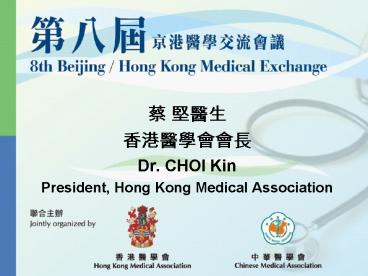Dr' CHOI Kin - PowerPoint PPT Presentation
1 / 17
Title:
Dr' CHOI Kin
Description:
The forum was first initiated in 1997 to discuss pediatric problems and since ... Cardiology, Diabetes, Orthopaedics, the Climacteric and AID & Sexual Health in ... – PowerPoint PPT presentation
Number of Views:35
Avg rating:3.0/5.0
Title: Dr' CHOI Kin
1
- ? ???
- ???????
- Dr. CHOI Kin
- President, Hong Kong Medical Association
2
- The Hong Kong Medical Association welcomes
delegates from Beijing and Macau as well as
colleagues in Hong Kong to this Beijing/ Hong
Kong Medical Exchange Forum.
3
- This is the eighth time we hold this exchange to
foster academic relationship and knowledge
exchange and transfer between China and Hong
Kong.
4
- The forum was first initiated in 1997 to discuss
pediatric problems and since then have proceed to
look into Obstetrics Gynaecology, Cardiology,
Diabetes, Orthopaedics, the Climacteric and AID
Sexual Health in China and Hong Kong.
5
- Useful dialogues have emerged and we decided on
our topic in Community and Family Medicine this
year.
6
- Family medicine is provided by primary care
physicians and provided at the first point of
contact. It is undifferentiated medicine,
holistic in nature, and requires the doctor to
look at the physical, psychological and social
aspect of the patient.
7
- The family physician acts as a gate keeper to
help minimize unnecessary investigations and
hospital admissions. He treats the person
instead of an organ and looks after and supports
the family instead of just a single patient. He
uses evidence-based medicine to treat his patient
and offers preventive care for his patients.
8
- Numerous studies in various countries have
confirmed that the family medicine approach is
the most cost-effective way to provide medical
care to the population.
9
- We have witnessed a shift in emphasis in Hong
Kong in the last few years with government
providing more resources for Family Medicine.
More training opportunities in this field have
been opened up for young graduates to ensure a
safe practicing standard in the community when
they finish their contract.
10
- But have we looked at the market requirement?
Have we looked at their training program and see
if it really helps the young trainees to survive
in the community? Have we followed their
post-training course, their job opportunities
since departure from the Hospital Authority and
their salary scale since? Have we monitored their
standards after they left their training post in
the Hospital Authority?
11
- All these unanswered questions have implications
on the content of the training program.
12
- In China, we have heard and witnessed a
determination for change. We know that it is
difficult for the vast population in rural China
to get good medical care. We know about red
packets and rebates and saw it on television
reports. We have our doubts on some of the
standard practices in China including the
intravenous drips for almost all attendance.
13
- We read about the false and fatal medications and
drugs created by the pharmaceutical industry. We
can appreciate that the Health Minister demanded
changes.
14
- The linkage between China and Hong Kong in
collaborating to standardize specialist program
and examination has been hailed as a success.
However, most specialist service is out of bound
to the majority of rural population in China.
15
- We learned that China may wish to model itself
after NHS in health care. But NHS can only
foster in a welfare state, in a country where
taxation is high, and although at one time was a
pride of the United Kingdom, is fast collapsing
because of colossal demand despite huge financial
support.
16
- China and Hong Kong must have its own way
forward. We may look for guidance in the way
that primary care is provided in other countries,
but in the end, we must have our own way based on
our own doctors training, standard, our own
taxation system, and our own vision of how much
basic care should be provided to citizens that
will satisfy their demand for health care.
17
- I hope we have a fruitful discussion.
- Thank you.































